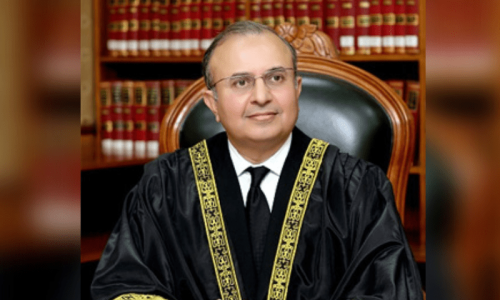A FROSTY exchange between Prime Minister Imran Khan and Afghan President Ashraf Ghani during a conference in Uzbek capital Tashkent has brought to the fore Kabul’s unjustified claims regarding Pakistan’s role in the Afghan imbroglio. Mr Ghani had talked of Pakistan’s “negative role” in his country, alleging that 10,000 militants had slipped into Afghanistan from Pakistan.
Separately, in another dubious claim the Afghan vice president had alleged that the PAF had provided air support to the Afghan Taliban during clashes between Kabul and the insurgents at Spin Boldak. These claims were denied by the Foreign Office. Regarding Mr Ghani’s outburst, the prime minister rightly pointed out it was “highly unfair” of the Afghan leader to heap the blame of Afghanistan’s implosion on Pakistan.
It is unfortunate that the Afghan president chose to air such controversial views at a multilateral gathering. It appears that as the Western-backed Kabul government crumbles, Mr Ghani and others in his circle are choosing to deflect the blame for their failures towards Pakistan. Frankly, Mr Ghani is appearing more hawkish towards Pakistan than some of the openly pro-India Afghan politicians. An Afghan peace conference scheduled in Pakistan was also postponed on the request of Ashraf Ghani. While the Kabul government and the Taliban continue talks in Doha, the chances of a coalition government in Afghanistan appear quite slim. However, political players in Kabul must realise that Pakistan’s input in the process will be vital, even if this country’s influence over the Taliban has diminished considerably. Considering its geographical, historical and cultural proximity to Afghanistan, Pakistan cannot be left out of the Afghan equation.
Blaming Pakistan for the failures of Kabul — as well as the failures of the Afghan government’s Western patrons — is blatantly unfair. After all, the question of why the US and Nato, the world’s most powerful military machine, were unable to completely dislodge the Taliban and other insurgents despite occupying the country for two decades remains unanswered. Perhaps Ashraf Ghani and the anti-Pakistan hawks in Kabul can answer this better.
After spending hundreds of billions of dollars, and losing thousands of lives, the US and its allies have clearly lost the Afghan war, and America’s protégés in Kabul are in no position to blame Pakistan, especially when the Afghan army itself is incapable of defending the country. While mistakes might have been made when Pakistan had recognised the Taliban after the 1996 takeover — along with Saudi Arabia and the UAE — this time around it seems that the government is pursuing a more balanced Afghan policy. The top civil and military leadership of Pakistan has said this country does not want to play favourites in Afghanistan. Therefore, instead of blaming Pakistan for its woes, the Kabul government should work with regional states to try and hammer out a solution before Afghanistan collapses into complete chaos yet again.
Published in Dawn, July 18th, 2021











































